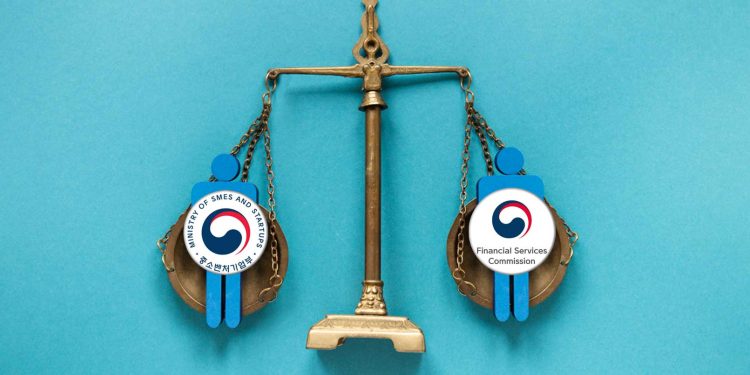Korea’s startup ecosystem is facing a turning point as policymakers move to address a long-standing legal imbalance that has left founders exposed to personal financial risk. Lawmakers are now targeting the “hidden liability” clauses embedded in investment contracts, which have persisted despite previous reforms meant to protect entrepreneurs and promote fair risk-sharing in the venture capital market.
Lawmakers Push to Close the Liability Gap in Korea’s Venture Capital Regulation
The controversy centers on Korea’s dual venture investment framework, where two different sets of rules govern the same type of investors.
Under the Venture Investment Promotion Act (VIPA)—supervised by the Ministry of SMEs and Startups (MSS)—founders are shielded from joint and several liability unless they act with intent or gross negligence.
However, new technology finance companies (NTFs), which fall under the Financial Services Commission (FSC) and operate through the Specialized Credit Finance Act (SCFA), are not bound by the same restrictions. This legal gap allows NTFs—including KDB, IBK Capital, and Shinhan Capital—to impose joint-liability clauses on founders, effectively forcing personal guarantees even when business failures are beyond their control.
Despite recent reforms under the MSS, the FSC-regulated sector remains exempt, creating a dual system that undermines Korea’s efforts to modernize its venture capital environment.
How Korea’s Dual Startup Investment Laws Created a Structural Weakness
The issue traces back to Korea’s unique two-track venture investment system—an uncommon setup among global startup hubs.
Venture capital firms (창업투자회사) operate primarily under the MSS’s equity-investment framework, while NTFs evolved from non-bank lenders focusing on debt-based investments. Over time, both began participating in venture funding, but their regulatory environments never converged.
This divide has led to unequal treatment of founders. Even after Korea’s 2022 reform that banned joint guarantees in venture capital contracts, the absence of matching provisions in the FSC’s law means NTFs can still require founders to bear third-party liability.
Industry data show that these firms accounted for about KRW 2.7 trillion in venture investments during the first half of 2025, nearly matching the total investment volume of traditional venture capital firms.
Industry Leaders and Lawmakers Call for Unified Venture Investment Reform
The Startup Alliance and several industry experts have urged the government to harmonize the rules, arguing that all investment entities should operate under a consistent principle of fairness.
Independent lawmaker Kim Jong-min recently proposed a bill to amend the Specialized Credit Finance Act, explicitly prohibiting NTFs and their investment associations from imposing joint-liability obligations on founders—except in cases involving willful misconduct or gross negligence.
Experts also warned about “toxic clauses” disguised as financial safeguards. These include:
- Redemption rights, which guarantee repayment of principal.
- Total-return guarantees, which require fixed investor profit regardless of outcome.
- Put-option clauses, which force founders to buy back shares in case of business trouble.
According to the Venture Market Research Institute (KVMI), these clauses are functionally equivalent to joint guarantees, allowing investors to demand early repayment or asset seizure when startups face distress.
Bae Seung-wook, head of the institute, said,
“The term ‘joint guarantee’ may have disappeared, but the behavior remains. Korea needs concrete, enforceable laws to define and restrict these practices. Otherwise, founders will continue to bear excessive managerial risk that discourages innovation.”
Why Founder Protection Is Key to Korea’s Global Venture Competitiveness
Beyond the fact that this structure has caused a legal inconvenience, Korea’s dual legal regulatory has also become a credibility issue for the nation’s startup ecosystem.
Global venture hubs such as the United States, Israel, and Singapore operate under harmonized frameworks that protect founders regardless of investor type. In contrast, Korea’s fragmented system creates uncertainty for both domestic entrepreneurs and foreign investors evaluating the market.
If the legal disparity persists, founders may become reluctant to accept capital from certain institutions, skewing funding flows and weakening the early-stage pipeline. For international investors, inconsistent liability standards add unnecessary risk, undermining confidence in Korea’s venture environment.
Unifying the legal framework across ministries would not only protect founders but also signal Korea’s readiness to compete as a global venture capital hub. By aligning investor accountability, Korea could strengthen transparency, attract cross-border funds, and restore balance to its innovation economy.
Korea’s Next Policy Test: Building a Fair and Globally Aligned Startup Ecosystem
Finally, this debate becomes not just a legislative update but also a measure of Korea’s commitment to nurturing a balanced and globally credible startup ecosystem. If reforms proceed, the move could close one of the most persistent gaps in the country’s venture policy architecture.
The outcome will reveal whether Korea can evolve from a two-track system burdened by regulatory silos into a unified innovation economy that protects founders while inviting global capital with confidence.
🤝 Looking to connect with verified Korean companies building globally?
Explore curated company profiles and request direct introductions through beSUCCESS Connect.
– Stay Ahead in Korea’s Startup Scene –
Get real-time insights, funding updates, and policy shifts shaping Korea’s innovation ecosystem.
➡️ Follow KoreaTechDesk on LinkedIn, X (Twitter), Threads, Bluesky, Telegram, Facebook, and WhatsApp Channel.





